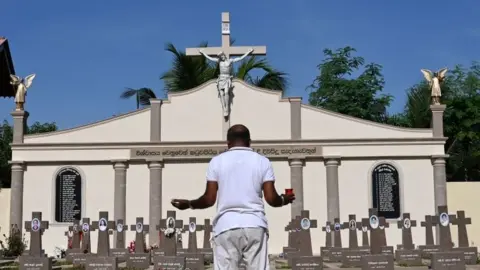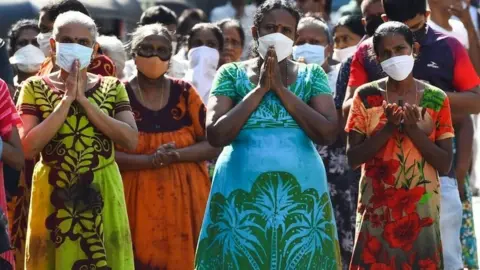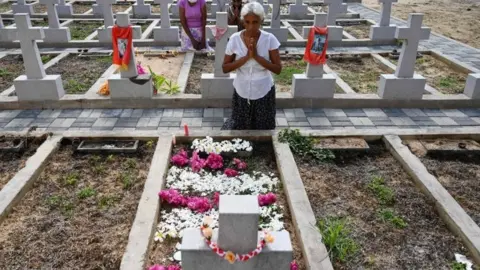Sri Lanka attacks: Easter Sunday bombings marked one year on
 AFP
AFPChurch bells have rung out across Sri Lanka, marking one year since 269 people were killed by a group of suicide bombers.
But there are no other large-scale events planned to remember the men, women and children - from worshippers celebrating Easter in church to tourists enjoying breakfast in hotel restaurants - whose lives were ended 12 months ago.
Sri Lanka has been observing a curfew since March, as it tries to contain the spread of coronavirus, which has so far killed seven on the island nation.
But the day is not going unnoticed - not least for those whose lives were changed forever by the violence.
 AFP
AFPSaranya, 25, was nine months pregnant when a bomb went off at St Anthony's Church in the capital Colombo last year. Her husband was killed in the attack. Just a day later, she gave birth to their son.
"My husband never saw his son," she told AFP news agency. "My baby will be one year old on the 22nd, but how can we celebrate. It is a day after his father's death anniversary. It is a sad day for us."
Anusha Kumari, whose family were caught up in the attack on St Sebastian's Church in Negombo near the capital, told the BBC's Jane Corbin earlier this year: "My husband and my two children were killed only once. I die every second."
A private ceremony was held on Tuesday for survivors. All other public ceremonies were cancelled due to the coronavirus outbreak. There had been plans to unveil two monuments to those killed, and to hold a number of church services.
Two minutes of silence were observed countrywide at 08:45 (03:15 GMT), marking the time of the first report of the six blasts which went off in quick succession. The country's television stations also went silent in tribute on Tuesday.
In an anniversary message, Archbishop of Colombo Cardinal Malcolm Ranjith said that while the church has "spiritually forgiven" the attackers, their supporters should still be brought to justice.
 AFP
AFPInvestigations into the attacks are continuing. Parliament heard last year that an Indian intelligence warning at the beginning of the month about planned attacks was not properly shared by officials in the previous administration.
"It is unconscionable that dozens of people in government, the highest senior elected officials, were made aware of warnings and of intelligence reports, and absolutely failed to investigate," Dhulsini de Zoysa, whose 11-year-old son Kieran was killed at the Cinnamon Grand Hotel, told the BBC documentary.
"Kieran's father and I feel that it is a call for accountability - the highest elected officials. We have had no acknowledgement that we've lost the most precious person in our lives - nothing at all; not even condolences."
What happened?
Nine suicide bombers detonated their devices in six locations around the country on Easter Sunday last year.
Reports of the explosions first came in at about 08:45 (03:15 GMT) on 21 April.
Three blasts were at churches: in the Kochchikade district of Colombo; in Negombo, to the north of the capital; and in the eastern city of Batticaloa. The churches were packed with worshippers celebrating Easter.
The other three blasts were at three luxury hotels in the capital - the Shangri-La, Kingsbury and Cinnamon Grand.


After those initial blasts, two other explosions were reported as police searched for the suspects. One was in Dehiwala in southern Colombo, and another one near the Colombo district of Dematagoda.
Later on Easter Sunday 2019, an improvised device was found and defused close to the country's main airport, near Colombo.
The following day, another explosion occurred on a street near a church in Colombo. Police were attempting to defuse devices in a vehicle used by the attackers when it suddenly blew up.
According to police sources, the attackers had planned an explosion at a fourth hotel but it failed.
Who were the victims?
According to a report by a parliamentary committee which investigated the bombings, the final death toll was 269 (excluding the attackers). The death toll had climbed to 359 in the days after the attacks, but it was later revised down by the government which blamed a calculation error.
One of the first victims to be identified was celebrity chef Shantha Mayadunne. Other Sri Lankans killed in the attacks were members of the church and staff at the hotels.
One man, Ramesh Raju, was killed at Zion Church after denying the bomber entry to the service. As he did so, the bomb detonated. It is said that Ramesh saved hundreds of lives with his actions.
A number of foreigners were also killed in the attack. They came from the UK, Denmark, Portugal, India, Turkey, Australia, the Netherlands, Japan, Switzerland, Spain, Bangladesh, the US and China.
Who was behind the attacks?
Shortly after the attacks, authorities in Sri Lanka said local militant group National Thowheed Jamath (NTJ) were to blame.
Islamist preacher Zahran Hashim, who founded the NTJ but was reportedly later expelled from the group, is suspected of having been the bombers' ringleader. He blew himself up at a hotel in Colombo.
However the Islamic State (IS) militant group claimed responsibility for the attacks. It released video of men it says were the bombers, pledging allegiance to the group - however all but one of the men have their faces covered in the footage.
A video released by IS showed Hashim pledging allegiance to the group's then leader Abu Bakr al-Baghdadi.
UK officials told the BBC last year that it is highly likely that IS was linked to the attack in some way.
Two of the bombers are said to have been the sons of a wealthy and well-known spice trader. All but one of the nine bombers came from middle or upper class families.
